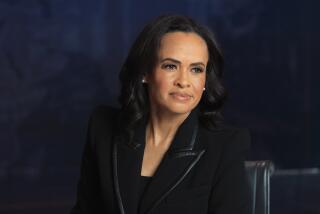Vargas’ pregnant pause reignites job-kid debate
- Share via
NEW YORK — ABC anchor Elizabeth Vargas’ recent announcement that she would be giving up one of the most prestigious jobs in broadcast news because she is expecting her second child was viewed with skepticism among some television industry observers, who noted the sharp ratings decline at “World News Tonight” this season.
But in the awkward merger of her personal and professional lives, others have found a very public reminder of the conundrum facing a generation of women raised to believe they could do whatever they set out to achieve -- and are finding that increasingly difficult to fulfill.
For these women -- many of them daughters of the feminist movement -- Vargas’ situation exemplifies the agonizing decisions that define their daily lives and has reignited a passionate conversation about the tradeoffs of balancing a career and parenting.
“I think the generation before us, everyone thought you could have it all, and our generation is realizing you have to make choices,” said Beth Osisek, 41, a former ABC producer and mother of two, who had a flurry of exchanges with her friends about the 43-year-old Vargas’ move. (She’s being replaced by veteran ABC newsman Charles Gibson, longtime co-host of “Good Morning America,” who begins anchoring the evening newscast tonight.)
“Some women are very critical; some are very supportive,” added Osisek, who lives in L.A. and does freelance work. “It’s a struggle that we all go through.”
When she was first appointed to the post in December, Vargas said she felt it particularly important for a woman to succeed in the role. Now, she admits she’s worried that her decision will be misinterpreted.
“I would urge people not to draw conclusions about the ability of a woman or a mother to do this job,” she said last week. “It just didn’t turn out to be something I could do this year. This isn’t a judgment on any other women who decide to do something differently.”
But for some, Vargas stepping down felt like a letdown, an unhappy confirmation of how tricky the juggling act really is.
“Ultimately, it makes me a little bit sad,” said Rebecca Benghiat, 29, executive director of a New York nonprofit and the mother of a 6-month-old. “As a woman and a feminist, it’s always nice to see other women achieving firsts. But as a new parent, I feel I’m the last person on the planet to judge. No one has the right answer. You sort of figure if everything makes you feel a bit guilty, you’re doing OK.”
Lisa Hill, a former New York television anchor and reporter who stopped working after her son was born, said she’s noticed that many of her friends are confronting their limits, albeit with reluctance.
“You have to get into a really small group with a bunch of girls and have a glass of wine before it comes out,” said Hill, 42, who now lives in Haymarket, Va. “But more and more women are admitting they can’t do it all, can’t bring home the bacon and fry it in the pan and wash the baby. We’d never admit that 15 years ago, that we couldn’t balance it all.”
In many ways, the chatter generated by Vargas’ decision is just the latest version of a conversation that’s been going on for decades -- particularly in the television news industry, a field that demands constant availability. The ABC anchor isn’t the first to confront the challenge of combining motherhood with an on-air schedule. CNN’s Soledad O’Brien has four children, including 20-month-old twins. Katie Couric, who has two daughters, was pregnant with her first when she was named co-anchor of NBC’s “Today” show 15 years ago. That same year, Meredith Vieira left CBS’ “60 Minutes,” criticizing producers for their lack of flexibility after they declined to let her work part time when she became pregnant with her second child.
“I had a lot of people who latched on to that and said, ‘Thank God you put family first,’ ” Vieira said in April after she was chosen to replace Couric on “Today.” “I have mixed feelings about that because I think everybody has to follow their own path. It’s about finding what works for you.”
Former ABC correspondent Jackie Judd, who worked at the network for 16 years, pondered that same calculus. When she was covering the Monica Lewinsky scandal in 1998, she was away from home so much that one of her twin sons, then 7, saw her on the muted television one day and kissed the screen.
“The flip side of it is that I was a better mother for having the fulfillment of a job that I loved,” said Judd, who left ABC in 2003 to take a job in public relations, in part because it allowed her to spend more time with her family. “You can have it all, but along the way, there’s a tremendous amount of juggling and balancing and setting priorities and making sacrifices.”
For Vargas, that has meant assessing the effect of an unexpected but welcome pregnancy even as she was settling into the top job in network news.
“My first reaction was, ‘This timing is not ideal,’ ” she said.
Ever since her co-anchor, Bob Woodruff, was seriously injured in Iraq in late January, Vargas had largely led “World News Tonight” by herself, essentially making her the first sole female anchor of an evening newscast. It has not been the best of times at the broadcast -- in the last year, the audience declined by more than 900,000 viewers.
In the wake of ABC’s announcement last week that it was reshuffling anchors, many media observers questioned Vargas’ statement that she was leaving the newscast because of her pregnancy, arguing that she would likely be returning after her maternity leave if the program had fared better under her watch. Some female broadcasters privately expressed dismay that her departure was being attributed to her pregnancy and not what appeared to be a clear business decision.
But despite the poor ratings, Vargas said she did not feel pressure to step down.
“I think not enough concession is being given to the staff and the show for everything we had to endure,” she said, noting that Woodruff’s wounding came just six months after anchor Peter Jennings died of lung cancer. “We’ve been at a distinct disadvantage. I never felt that anybody felt it was my fault.”
ABC News President David Westin said it was Vargas’ decision to pull back, adding that she “did an outstanding job for us.”
A difficult pregnancy and warnings from her doctors forced her to realize she had to slow down in the short term, Vargas said, leaving the broadcast without a regular anchor for several months. She and Westin agreed that pairing her with Gibson would not be the right fit, she added.
Vargas, who will remain a co-anchor on the newsmagazine “20/20” after having her baby, said the decision to walk away from the evening news was “excruciatingly hard.”
“It’s one thing to say, ‘I’m willing to work a 75-hour work week, be on airplanes and travel the world,’ ” said the anchor, who also has a 3-year-old son with her husband, singer-songwriter Marc Cohn. “It is another thing to ask your children to pay the price for that.”
Still, some said Vargas’ choice is likely to be taken to heart by women on both sides of the so-called mommy wars.
“It’s a little bit of a letdown, especially for career women,” said Hill, the former New York television anchor. “Here she had a golden opportunity to be a main anchor, it’s in her hands, and she’s just going to let it go away. But the stay-at-home moms might be saying, ‘Aha! See, I told you you couldn’t do it all.’ ”
Such debates frustrate Miriam Peskowitz, author of “The Truth Behind the Mommy Wars: Who Decides What Makes a Good Mother?”
“All the talk about whether she’s wrong to do it or whether she’s right -- that’s not helpful,” Peskowitz said. “The real conversation needs to be that we’re losing too many women at the top.
“It has been about 20 years that women have been rising through the ranks to attain positions of power and influence in society, and this is the period of a new baby boom precisely among those women. What they’re finding is that the workplace will accept them as women but not as mothers, and they’re really struggling with that.”
The frustration is so widespread that some believe it has the makings of a new political movement. This month, MoveOn.org co-founder Joan Blades and author Kristin Rowe-Finkbeiner formed MomsRising, an advocacy organization that aims to promote better support for mothers through improved parental leave and flexible work policies, among other measures. The group -- which grew out of the pair’s recent book, “The Motherhood Manifesto: What America’s Moms Want -- and What to Do About It” -- signed up 50,000 members within weeks.
Jill Herzig, executive editor of Glamour magazine and a mother of two, believes one problem may be that this generation of mothers is trying too hard to come up with the exact formula for success.
“One thing I have found is that a lot of the guilt and sense of anxiety come from your own need to be perfectly in control of your home life and work life, and something has got to give,” Herzig said. “The notion of balance is one that this generation has really adopted. It remains to be seen whether balance is the thing to strive for or whether the search for balance is the Holy Grail, the same way whether doing it all was such an unrealistic goal. Balance can box you in.”


